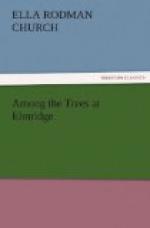“An apple-orchard in autumn,” continued their governess, “is often a merry scene. Ladders are put against the trees, and the finest apples are carefully picked off, but such as are to be used for cider-making are shaken to the ground. Men and boys are at work, and even women and children are there with baskets and aprons spread out to catch the fruit; and they run back and forth wherever the apples fall thickest, with much laughter at the unexpected showers that come down upon their heads and necks. Large baskets filled with these apples are carried to the mill, where, after being laid in heaps a while to mellow, they are crushed and pressed till their juice is extracted; and this, being fermented, becomes cider. From this cider, by a second fermentation, the best vinegar is made.”
[Illustration: THE APPLE-HARVEST.]
“Miss Harson,” asked Edith, as the talk seemed to have come to an end, “isn’t there any more about apple trees? I like ’em.”
“Yes, dear,” was the reply; “there is more. I was just looking over, in this little book, some queer superstitions about apple trees in England, and here is a strange performance which is said to take place in some very retired parts of the country:
“’Scarcely have the merry bells ushered in the morning of Christmas than a troop of people may be seen entering the apple-orchard, often when the trees are powdered with hoarfrost and snow lies deep upon the ground. One of the company carries a large flask filled with cider and tastefully decorated with holly-branches; and when every one has advanced about ten paces from the choicest tree, rustic pipes made from the hollow boughs of elder are played upon by young men, while Echo repeats the strain, and it seems as if fairy-musicians responded in low, sweet tones from some neighboring wood or hill. Then bursts forth a chorus of loud and sonorous voices while the cider-flask is being emptied of its contents around the tree, and all sing some such words as these:
“’"Here’s
to thee, old apple tree!
Long mayest thou grow.
And long mayest thou blow, and ripen the apples
that hang on
thy bough!
“’"This
full can of apple wine,
Old tree, be thine:
It will cheer thee and warm thee amid the deep
snow;
“’"Till
the goldfinch—fond bird!—
In the orchard is heard
Singing blithe ’mid the blossoms that whiten
thy bough."’”
“But what did they do it for?” asked Malcolm, who enjoyed the account as much as the others. “There doesn’t seem to be any sense in it.”
“There is no sense in it,” replied his governess, “but these ignorant people had inherited the custom from their fathers and grandfathers, and they really believed—and perhaps still believe—that this attention would be sure to bring a fine crop of apples. We are distinctly told, though, that ‘it is God that giveth the increase;’ and to him alone belong the fruits of the earth. Sometimes the crop is so great that the trees fairly bend over with the weight of the fruit, and there is an old English saying: ’The more apples the tree bears, the more she bows to the folk.’”




